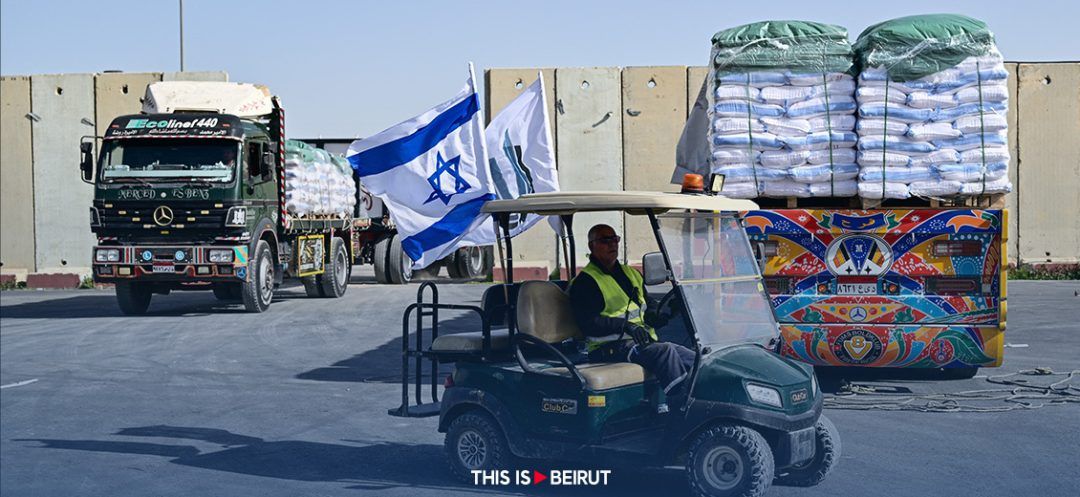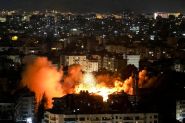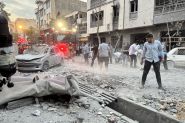- Home
- War in the Middle East
- UN Call for Direct Hotline with Israeli Forces

©(Photo by Alberto PIZZOLI / AFP)
The outgoing UN humanitarian coordinator emphasized on Friday the necessity for the United Nations to establish a direct hotline with Israeli forces engaged in combat in Gaza. This measure is deemed crucial by the UN to address mistrust, ensure the safe and effective delivery of aid, and enhance humanitarian efforts in the region.
The United Nations needs a direct hotline to Israeli forces fighting in Gaza to combat mistrust and deliver aid safely and effectively, outgoing UN humanitarian coordinator Jamie McGoldrick insisted on Friday.
Rather than going through liaison bodies, the UN and other humanitarian actors "need to be speaking to people who are firing guns," McGoldrick told a press briefing in Geneva.
The Israeli army and humanitarian groups in Gaza need to understand each other better, he said following a final visit to the Palestinian territory at the end of a three-month posting as interim humanitarian coordinator in the Palestinian territories.
"If we have a serious security incident, we don't have a hotline," he said, speaking by video link from Jerusalem.
"The [Israeli forces] have never worked with humanitarian organizers before in this type of environment. They don't understand how we function; they don't understand our language and what our purpose is. And we don't understand their expectations."
"There's a degree of mistrust and misunderstanding that we have to address."
"We want to work with them differently."
He said that agencies had been warning Israel about the flawed notification system before the April 1 fatal attack on staff from the World Central Kitchen (WCK) charity.
"We've been asking for a couple of things since day one," McGoldrick said.
"We don't deal directly with the [Israeli forces]. We need to be speaking to people who are firing guns and controlling weaponry, and we have to build up an understanding."
"We have to have a hotline and the ability to speak to them."
Since the WCK attack, which killed seven aid workers and triggered an international outcry, McGoldrick said: "I don't think there's been any notable improvement in terms of our ability to move around," and humanitarian workers "fear for their own safety."
McGoldrick met this week with Major General Yaron Finkelman, head of the Israeli Army Southern Command, to try to straighten out some problems.
McGoldrick said that in the weeks ahead, "if we don't have the chance to expand the delivery of aid into all parts of Gaza, but particularly to the north, then we're going to face a catastrophe."
Aid from New Crossing
The Israeli Army said on Friday that an undisclosed number of aid trucks were allowed to enter Gaza a day earlier through a newly opened crossing in the Palestinian territory's north.
A video the agency released in the tweet showed military vehicles and at least one truck laden with pallets full of tightly wrapped white bags entering Gaza.
Despite repeated AFP requests for comment, Israeli authorities did not disclose how many trucks entered Thursday nor the exact location of the new crossing, which Israeli media reported to be close to the Zikim kibbutz.
with AFP
The United Nations needs a direct hotline to Israeli forces fighting in Gaza to combat mistrust and deliver aid safely and effectively, outgoing UN humanitarian coordinator Jamie McGoldrick insisted on Friday.
Rather than going through liaison bodies, the UN and other humanitarian actors "need to be speaking to people who are firing guns," McGoldrick told a press briefing in Geneva.
The Israeli army and humanitarian groups in Gaza need to understand each other better, he said following a final visit to the Palestinian territory at the end of a three-month posting as interim humanitarian coordinator in the Palestinian territories.
"If we have a serious security incident, we don't have a hotline," he said, speaking by video link from Jerusalem.
"The [Israeli forces] have never worked with humanitarian organizers before in this type of environment. They don't understand how we function; they don't understand our language and what our purpose is. And we don't understand their expectations."
"There's a degree of mistrust and misunderstanding that we have to address."
"We want to work with them differently."
He said that agencies had been warning Israel about the flawed notification system before the April 1 fatal attack on staff from the World Central Kitchen (WCK) charity.
"We've been asking for a couple of things since day one," McGoldrick said.
"We don't deal directly with the [Israeli forces]. We need to be speaking to people who are firing guns and controlling weaponry, and we have to build up an understanding."
"We have to have a hotline and the ability to speak to them."
Since the WCK attack, which killed seven aid workers and triggered an international outcry, McGoldrick said: "I don't think there's been any notable improvement in terms of our ability to move around," and humanitarian workers "fear for their own safety."
McGoldrick met this week with Major General Yaron Finkelman, head of the Israeli Army Southern Command, to try to straighten out some problems.
McGoldrick said that in the weeks ahead, "if we don't have the chance to expand the delivery of aid into all parts of Gaza, but particularly to the north, then we're going to face a catastrophe."
Aid from New Crossing
The Israeli Army said on Friday that an undisclosed number of aid trucks were allowed to enter Gaza a day earlier through a newly opened crossing in the Palestinian territory's north.
A video the agency released in the tweet showed military vehicles and at least one truck laden with pallets full of tightly wrapped white bags entering Gaza.
Despite repeated AFP requests for comment, Israeli authorities did not disclose how many trucks entered Thursday nor the exact location of the new crossing, which Israeli media reported to be close to the Zikim kibbutz.
with AFP
Read more



Comments